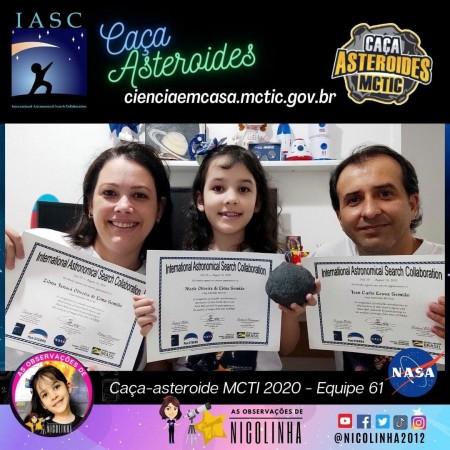At the age of seven, children are usually chasing stars on their homework sheets. Which is precisely what seven-year-old Nicole Oliveira's mother also thought when she asked her for a star as a two-year-old. Nicole's fascination for space began with stars while she was a toddler.
At the time, she was handed over a toy star, but it wasn't long before her parents realised that she wasn't kidding. Today, to the amazement of many, including her family, she's the world's youngest astronomer.

Who's Nicole Oliveira
The seven-year-old from Brazil has helped NASA discover as many as seven asteroids, a feat that's earned her the title and the honour of being the world's youngest astronomer. Her official exposure and introduction to the world of astronomy began when Nicole took part in the Asteroid Hunt citizenship science programme. A programme run by the International Astronomical Search Collaboration and includes NASA.
Along with the achievement, comes the role and responsibilities that even many of the adults cannot fulfil. For instance, Oliveira was recently asked to speak at the Brazilian Ministry of Science, Technology and Innovation's 1st International Seminar on Astronomy and Aeronautics. Her age notwithstanding, she is used to presenting lectures in schools in her hometown of Maceio.
While congratulating Oliveira on their Facebook page, International Astronomical Search Collaboration wrote in a post, "Here is Nicole Oliveira de Lima Semiao and her parents, Zilma Janaca de Lima Semiao and Jean Carlo Lessa Semiao from Fortaleza, Brazil. They participated in the IASC asteroid search campaign sponsored by the Ministry of Science, Technology, & Innovations (Brasilia, DF).
What her achievement means
Apart from the fact that any bright, young talent anywhere in the world of science is a gift to humankind, Oliveira's discovery of seven asteroids carries a lot of scientific significance. Only a few robotics spacecraft missions have been able to encounter asteroids upclose.
The interest in asteroids is due to their potential as the remnant debris from the inner solar system formation process. Since some of these objects can collide with the Earth, an eye on them is inevitable for human existence. Asteroids are also important as they have significantly modified the Earth's biosphere in the past.
The first person ever to discover an asteroid was Giuseppe Piazza, who in 1801, accidentally discovered an object 1,000 kilometers in diameter between Mars and Jupiter. While most asteroids are numbered in the order of their discovery, some really significant ones and many others have been named too.









!['Had denied Housefull franchise as they wanted me to wear a bikini': Tia Bajpai on turning down bold scripts [Exclusive]](https://data1.ibtimes.co.in/en/full/806605/had-denied-housefull-franchise-they-wanted-me-wear-bikini-tia-bajpai-turning-down-bold.png?w=220&h=138)



